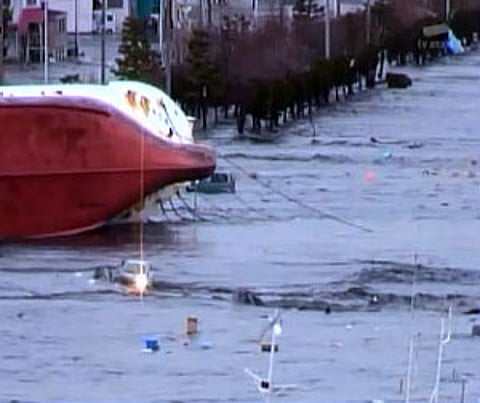

According to Yasuo Kunimitsu, co-founder and president of FIS Japan, the consequential damage caused by the recent earthquake – and resultant tsunami and after shocks – in Japan, will not become entirely apparent until mid-April at the earliest.
During a recent interview with Brian Loubet-Jambert, FIS English journalist, he shared some of the already visible impacts that the tsunami has had upon the seafood industry.
With regards to the destruction of fishing vessels, he conveyed that larger vessels have been relatively safe from the tsunami's impact, however, vast numbers of them which carry out their extractive activities around the coasts have been transferred to the main port in Chiba Prefecture, as their usual loading and discharging station has been completely demolished.
It is in fact the smaller sized boats that have suffered most, as many have been swept inland or out to sea and are either in a state of disrepair, or will require substantial funds to repair the damage which has been inflicted upon them.
Kunimitsu also explained the dire situation surrounding the Japanese aquaculture industry. Specifically, he referred to Sanriku and the surrounding areas, stating that it, "is well known among the farming sector for its production of coho salmon, oysters and seaweed, unfortunately, these facilities have been severely damaged or completely eradicated."
Whilst discussing fisheries, he spoke of the importance of Hachinohe city for the squid sector, which has had its port and facilities destroyed. He said that no one is quite sure whether the area will recover for the upcoming season or not, but that it will require a huge amount of effort and finance if it is to become realistically operational once again.
Additionally, mentioning Sanriku once more – a region which produces 20 per cent of Japans seafood – he said that its large river is likely to have considerable quantities of chum salmon during the upcoming autumn season, but that catching them will be difficult and even those that are caught will suffer from limited freezing services. He believes this situation will also be experienced in Saury.
The fortunes of the tuna fisheries are mixed and relatively unknown, as large vessels have changed ports and the bluefin tuna farming and fishing sector is based within the southern part of Japan, which means the tsunami's impact was limited.
However, Sanriku is also home to tuna operations, whose fixed-nets and facilities would have been lambasted.
Crucially, coastal supply of fresh fish will be almost, "at a standstill for a relatively long period of time," said Kunimitsu.
Moving on to processing factories and cold storage zones, he again mentioned the hard-hit area of Sanriku, as it is also known for its vast seafood processing zone.
"Large quantities of imported seafood had previously been processed in this area," he said. "But due to the tsunami, various factories and cold storage areas have been damaged and it will take some time for them to be recovered, which may mean that most companies will close their operations there.
"As a result of the condition of the area, importers have already begun moving their processing plants to third countries such as China, Thailand and Vietnam," he continued.
Speaking about seafood prices within Japan, he said that in the short term there will be a significant increase despite a decline in consumption due to logistical problems and a lack of catches.
He also stated that consumption is down as, "families are mainly just purchasing products such as bread, rice, canned foods, instant noodles and pasta, as they are available to eat easily and do not require cold storage."
Furthermore, Kunimitsu stated that the issue surrounding the Fukushima nuclear power plant will substantially affect exports due to radioactivity.
"Some Asian countries, such as Taiwan, are already carrying out checks on its imports of Japanese seafood to detect radioactivity. However, even if the shipments are not affected, foreign consumers will lose confidence in Japanese foods until the problem is completely resolved."
The nuclear power plant problem is also said to be hindering electricity supplies, specifically in the eastern area of Japan, which is making it increasingly difficult to sell fresh fish, including Sahimi, at supermarkets.
FIS (www.fis.com)
